Habakkuk Before Breakfast: Liturgy, Lament, and Hope by Brian J. Walsh and the Wine Before Breakfast community (Books Before Breakfast) $14.00
How should I begin this review of a book we are so excited to tell you about?
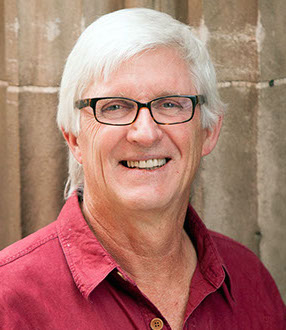
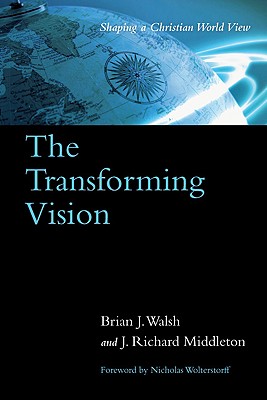
 Should I tell you about the author, my friend Brian J. Walsh, a former professor at Toronto’s Institute for Christian Studies and now CRC campus minister at the University of Toronto, who has co-written a handful of books that have been among my all time favorites? Should I remind you of some of his other titles such as the earnestly recommended The Transforming Vision: Shaping a Christian Worldview and Truth Is Stranger Than It Used to Be: Biblical Faith in a Postmodern Age or the extraordinary, hefty and wide-ranging social and Biblical analysis called Beyond Homelessness: Christian Faith in a Culture of Displacement released in 2008 and as germane as ever, and many others, including the really, really interesting Colossians Remixed: Subverting the Empire? I treasure his books and maybe you do to. (Whew, I could work up a head of steam just listing his important books!) Walsh’s work has been provocative, stimulating, important. I should be able to sell any book he wrote, because he’s that kind of author. I could start there.
Should I tell you about the author, my friend Brian J. Walsh, a former professor at Toronto’s Institute for Christian Studies and now CRC campus minister at the University of Toronto, who has co-written a handful of books that have been among my all time favorites? Should I remind you of some of his other titles such as the earnestly recommended The Transforming Vision: Shaping a Christian Worldview and Truth Is Stranger Than It Used to Be: Biblical Faith in a Postmodern Age or the extraordinary, hefty and wide-ranging social and Biblical analysis called Beyond Homelessness: Christian Faith in a Culture of Displacement released in 2008 and as germane as ever, and many others, including the really, really interesting Colossians Remixed: Subverting the Empire? I treasure his books and maybe you do to. (Whew, I could work up a head of steam just listing his important books!) Walsh’s work has been provocative, stimulating, important. I should be able to sell any book he wrote, because he’s that kind of author. I could start there.
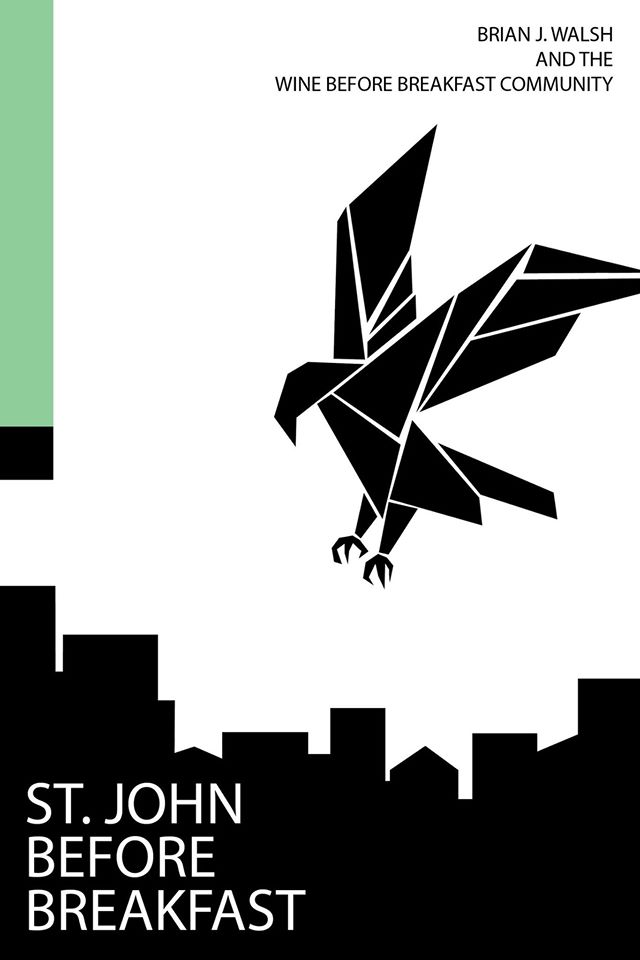 Or, should I tell you about the context of this project, the Wine Before Breakfast community, a weekly, early-morning group of students and others gathering around a creatively-curated liturgy and Eucharist in the heart of the University of Toronto? Want to know about that — young adults doing creative liturgy, campus ministry, folks worshiping together before 7:30 am? Who does that? That ought to draw you to this book, wanting to learn about these kinds of practices for renewal.
Or, should I tell you about the context of this project, the Wine Before Breakfast community, a weekly, early-morning group of students and others gathering around a creatively-curated liturgy and Eucharist in the heart of the University of Toronto? Want to know about that — young adults doing creative liturgy, campus ministry, folks worshiping together before 7:30 am? Who does that? That ought to draw you to this book, wanting to learn about these kinds of practices for renewal.
Brian and his comrades put together a year or so ago a previous book of reflections, litanies, homilies and prayers, walking through the gospel of John that also came out of their morning WBB Eucharists called Saint John Before Breakfast. That’s a way to start, saying this new one is like that one, that a lot of folks loved. Most reviews of sequels tell about the first one, and, man, that John Before Breakfast was something.
Maybe, I thought, I’d start off the review with a little meditation on the role of prophets. This new one is, after all, essentially a six week journey through the book of the Bible called Habakkuk, one of the more minor of the minor prophets. Of course, they are called that not 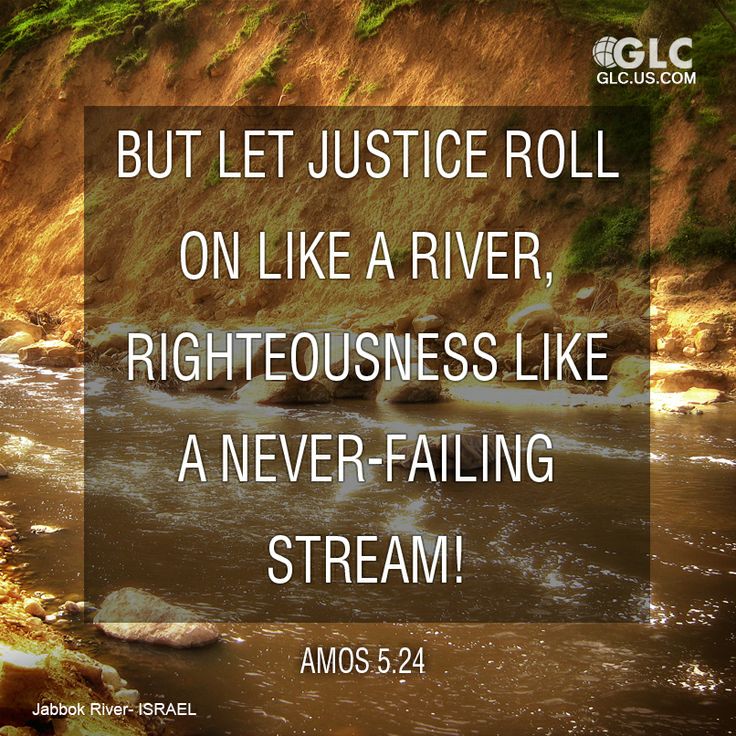 because of their meager message – au contraire – but because they are short. Jewish readers call all of them together The Book of the Twelve. I could start off talking about how studying Amos in college rocked my world, how seeing verses like Micah 6:8 drawn in early 70s calligraphy spoke to me, about how just last week I got to introduce young Christians to Isaiah 58. I’d say how years ago Walter Brueggemann’s Prophetic Imagination became so vital for so many of us., Walsh, too. I like that line from Malcolm Boyd, saying that often in church groups we study the prophets but we wouldn’t know one if one sat down next to us. He’s right, I’m afraid, about our general lack of prophetic discernment, but he’s mostly wrong that we study the prophets. I could start there.
because of their meager message – au contraire – but because they are short. Jewish readers call all of them together The Book of the Twelve. I could start off talking about how studying Amos in college rocked my world, how seeing verses like Micah 6:8 drawn in early 70s calligraphy spoke to me, about how just last week I got to introduce young Christians to Isaiah 58. I’d say how years ago Walter Brueggemann’s Prophetic Imagination became so vital for so many of us., Walsh, too. I like that line from Malcolm Boyd, saying that often in church groups we study the prophets but we wouldn’t know one if one sat down next to us. He’s right, I’m afraid, about our general lack of prophetic discernment, but he’s mostly wrong that we study the prophets. I could start there.
But I have to start with the cover. It may be the first thing you notice.
It looks a little hand-drawn, doesn’t it – actually, not quite the classy and professional cover design look one expects from serious books these days. New York book designer Chipp Kidd wouldn’t touch it with a ten-foot pole, unless maybe it was considered an ironic look, a sketchy booze bottle for some noir novel, done old school.
But this isn’t ironic. And I’ve grown to love it.
The cover choice speaks volume about this book and the community that gave rise to it.
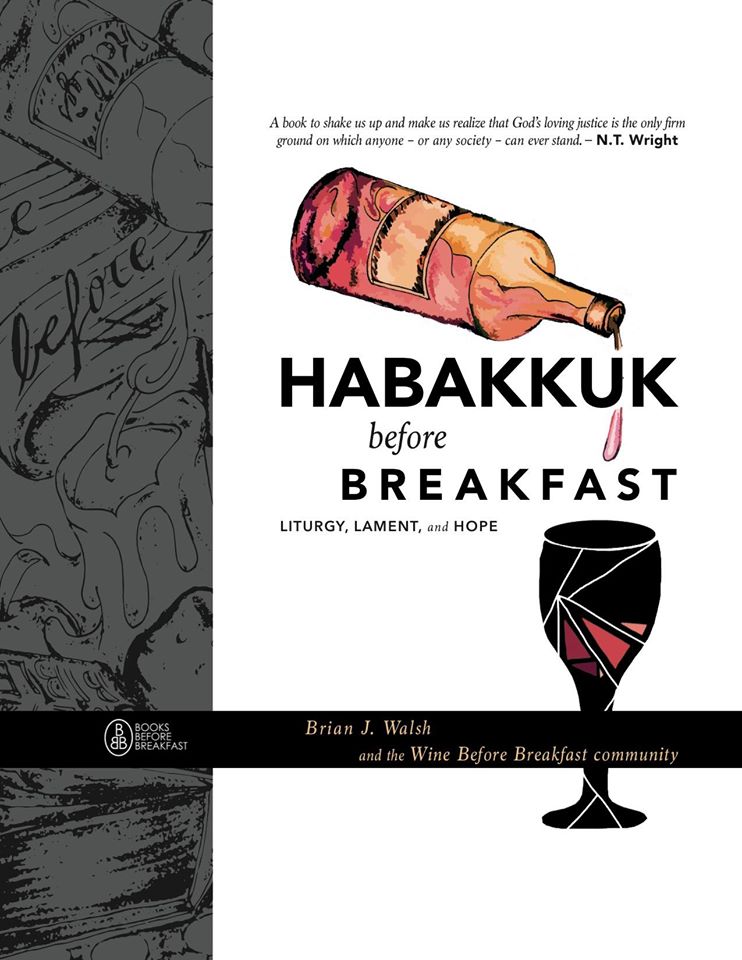 The cover of Habakkuk Before Breakfast shows a portion of a painting done by a First Nations artist who hung around the University of Toronto Wine Before Breakfast community, to whom the book is dedicated. Gregory “Iggy” Spoon died as the sermons and prayers and liturgies and reflections that became this book were being prepared and experienced. I recall reading a message from Brian about their pain and lament and anguish upon Iggy’s unexpected death in March 2015. Iggy’s death impacted their community (as did a few other deaths and tragedies that season) and Brian and the WBB community honored him as they mourned their loss. As the Hebrew prophet three millennia ago railed about a pious religious establishment that seemed to have little room for humility and care for the outsider, Iggy stood in their midst as a suffering brother, with gifts and goodness and insight and pain, like anyone, but with a past that seemed to make evident, I gather, much that is wrong with a formal religion that doesn’t understand hospitality, inclusion, or justice. Mostly, I guess, he was a beloved friend.
The cover of Habakkuk Before Breakfast shows a portion of a painting done by a First Nations artist who hung around the University of Toronto Wine Before Breakfast community, to whom the book is dedicated. Gregory “Iggy” Spoon died as the sermons and prayers and liturgies and reflections that became this book were being prepared and experienced. I recall reading a message from Brian about their pain and lament and anguish upon Iggy’s unexpected death in March 2015. Iggy’s death impacted their community (as did a few other deaths and tragedies that season) and Brian and the WBB community honored him as they mourned their loss. As the Hebrew prophet three millennia ago railed about a pious religious establishment that seemed to have little room for humility and care for the outsider, Iggy stood in their midst as a suffering brother, with gifts and goodness and insight and pain, like anyone, but with a past that seemed to make evident, I gather, much that is wrong with a formal religion that doesn’t understand hospitality, inclusion, or justice. Mostly, I guess, he was a beloved friend.
The painting Iggy made for them ended up on the altar as they celebrated communion, and, week by week as Iggy was in the hospital, someone in the community would receive the elements on his behalf: “The body of Christ, broken for Iggy.” “The blood of Christ, shed for our brother Iggy.”
Brian continues:
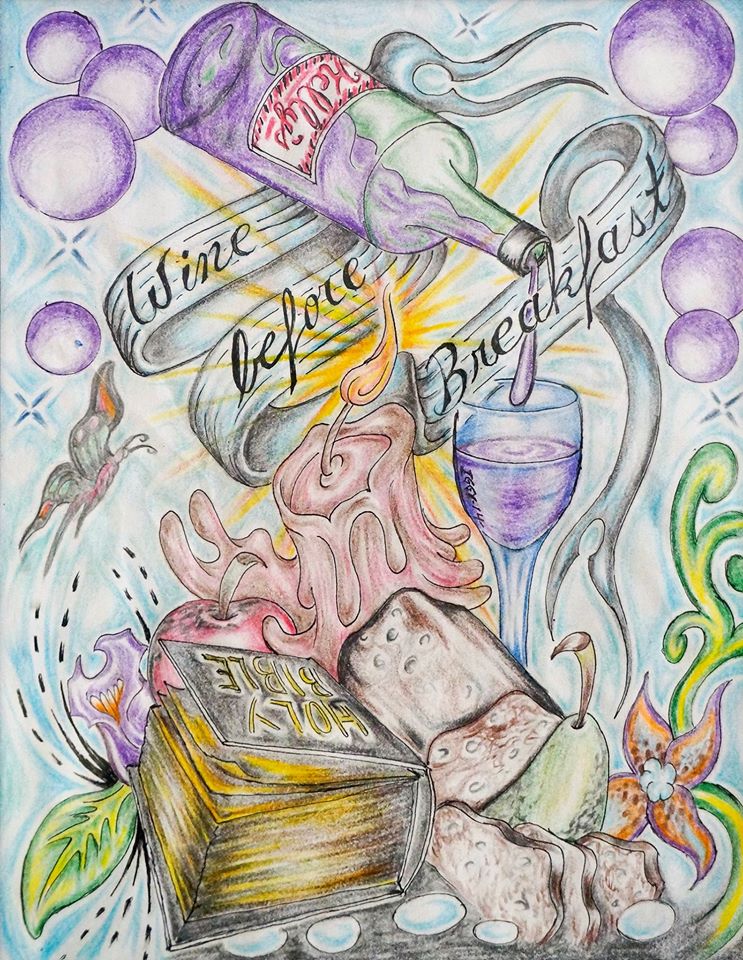 He had seen some pretty bad times in his life. And for some reason he kind of adopted Wine Before Breakfast as part of his extended community. Iggy would sometimes show up at the back of the chapel, or sometimes he’d be downstairs waiting for us when we came from worship to breakfast. And Iggy was a very fine artist. One day he showed me a picture that he was making for the community. A bottle of wine, a chalice, a loaf of bread, some fruit, an open book, a music staff with the name of our community written on it, and … a butterfly, a symbol of transformation. This was his gift to the community. But it wasn’t finished yet. He didn’t know what to write on the bottle. What vintage of wine? Or might he put the time and place of our services? Or might he (reaching into his satchel for the bottle) put “Kelly’s” on the bottle? Kelly’s is the cheapest and most potent wine that homeless folks drink. “I don’t know, should we put Kelly’s on that bottle?” Iggy asked. Yes, I replied. That’s exactly what should go on that bottle. If Wine Before Breakfast is about anything then surely we should be about taking such a terrible wine, a wine of such heartbreak and sorrow, and asking Jesus to make that a holy wine, a sacramental wine, the wine of the new covenant in his blood.
He had seen some pretty bad times in his life. And for some reason he kind of adopted Wine Before Breakfast as part of his extended community. Iggy would sometimes show up at the back of the chapel, or sometimes he’d be downstairs waiting for us when we came from worship to breakfast. And Iggy was a very fine artist. One day he showed me a picture that he was making for the community. A bottle of wine, a chalice, a loaf of bread, some fruit, an open book, a music staff with the name of our community written on it, and … a butterfly, a symbol of transformation. This was his gift to the community. But it wasn’t finished yet. He didn’t know what to write on the bottle. What vintage of wine? Or might he put the time and place of our services? Or might he (reaching into his satchel for the bottle) put “Kelly’s” on the bottle? Kelly’s is the cheapest and most potent wine that homeless folks drink. “I don’t know, should we put Kelly’s on that bottle?” Iggy asked. Yes, I replied. That’s exactly what should go on that bottle. If Wine Before Breakfast is about anything then surely we should be about taking such a terrible wine, a wine of such heartbreak and sorrow, and asking Jesus to make that a holy wine, a sacramental wine, the wine of the new covenant in his blood.
And so, the cover; the odd-shaped Kelly’s wine bottle poured into a broken chalice. In a way, it is precious just to own such a book, not mass produced, with no focus groups determining the viability of the cover art. This, my friends, is the real deal. This is a book that can help Jesus transform the terrible drink of “heartbreak and sorrow” into holy wine.
The book is great. It is arranged quite nicely. You’ll want to spend time with it, pondering deeply its often heavy message, maybe even with a group, it isn’t complicated or too long or dense.
It really is a glimpse into the weekly Wine Before Breakfast worship services held at the University of Toronto at 7:22 AM; the book reproduces some of the insight and pathos and beauty of that small community, and it not only has the brilliant and passionate reflections and homilies (not all by Walsh) but the prayers of the people and the prayers after communion and such; in this sense, it is very much like their much-appreciated first book, Saint John Before Breakfast. Besides good exegesis and powerful preaching, it is a glimpse into a worshiping body, mostly young adults, graduate students, professors and friends, and some who, I think, feel disenfranchised from the conventional church. There’s a lot written about that, but this is a ministry doing something about it.
Habakkuk Before Breakfast: Liturgy, Lament, and Hope is laid out on the page in such as way that it seems just a bit cleaner and clearer (with each section clearly designated) that their previous John one. Another difference, I think, is how interestingly it explains their music choices. Deb Whalen-Blaize is the music director and her section in each chapter is nearly brilliant as she allows us in to her thought process and discernment about what music–pop, folk, rock, alongside Taize and standard hymns – they use to underscore and develop the theme of the service. It is a really, really good portion of each chapter and hearing her so maturely interact with the Biblical content and Brian’s pastoral leadership to find just the right songs is very impressive.
Each chapter is a fully collaborative project, and although different people take turns doing different parts (except Whalen-Blaize who does the music portion each time) they are all mature, consistently thoughtful, raw, real, as they share their particular portions of the Wine Before Breakfast Eucharist.
Each chapter opens with a long reflection from Walsh which was, in fact, sent out to the core members of the community before the service. It invites them – through his own spiritual discernment, as he’s own dwelt with the Biblical text, informed, too, by things that were happening in their lives – to be prayerful and intentional about what is going to happen as they gather at their next fellowship meeting/worship service/Eucharist/communal breakfast. Hey, ya gotta love a group that has to have a “Bread Guild.”
I think this practice of sending out a communication prior to the service is one that some churches or fellowship groups might borrow, offering a pre-service reflection, a warm-up to the service. Walsh is powerful and poignant and his emailed epistles are themselves well worth pondering. In each case, they really do set the stage for the communal reading of the chapter from Habakkuk they are about to encounter.
Here is how Brian describes this piece:
This is sort of a spiritual priming of the pump; a beginning reflection on the biblical text that invites the community both into the world of the text and to a worship shaped by the text.
It is after that opening reflection that Deb Whalen-Blaize works her magic. Having her write about false starts and final choices, inspired by a careful reading of the Biblical portion, is like watching a great chef cook up a fancy meal. She tells us what songs worked, what lyrics she appreciated and why she chose them. For instance, she draws on Springsteen (what else but “My City in Ruins” when reading about the horror of a destroyed Jerusalem and the violence of Empire) and Leonard Cohen and the lovely “Falling Slowly” by Glen Hansard and Marketa.
An old blues song or two make an appearance, even an outtake of Van Morrison wailing out “Sometimes I Feel Like a Motherless Child” which surely worked well alongside great hymns and praise choruses. Okay, not too many praise choruses. But you’ve got to give props to a worship planner that uses Joe Pug and “It Is Well With My Soul” and “My Hope Is Built on Nothing Less…” or Counting Crows and “Be Thou My Vision.” Naturally, Dylan’s “All Along the Watchtower” suggested itself for reading Habakkuk 2. In fact, her reflection on the classic Dylan song is itself marvelous. (She is obviously a lover of all kinds of music, and her sophisticate and gift for picking stuff is a blessing. I wonder if her style of doing lyrical criticism was itself informed by Brian, who has always used music in his lectures and sermons. Heck, he wrote a whole book about it, Kicking at the Darkness: Bruce Cockburn and the Christian Imagination which some people read just to see his brilliant interplay of lyrics and Bible, even if one doesn’t love Cockburn as he does.) Anyway, Deb Whalen-Blaize is doing good work to keep this thing lively and poignant.
I mentioned how good her bit on “All Along the Watchtower” was. Very astute. Brian’s pre-service reflection that week – “Standing on the Watchtower… With Habakkuk, Dylan, and Hendrix” is fantastic, as he reflects on Hendrix’s re-tooling of Dylan’s acoustic bit of apocalyptic fervor, even as he deftly relates Habakkuk 2 and Isaiah 21. The dude knows his rock music, and he knows his Bible – a lot better than most.
In his sermon, then, he goes farther, reflecting on Paul’s use of Habakkuk in Romans. For those who follow New Testament studies, you’ll realize that Walsh’s quips and poetic lines in his homily that week are, in fact, informed by very serious study of the varying interpretations of what is meant by God’s righteousness, and what it means that the just live by faith. It’s a hugely significant connection, and it’s good.
Anyway, as he says:
“All I got is a red guitar,
Three chords and the truth.
All I got is a red guitar,
The rest is up to you.”
So adds Bono to Dylan’s’ “All Along the Watchtower.”
All I’ve got is an ancient text,
That has the ring of truth.
All I’ve got is an ancient text,
The rest is up to you.
Or, perhaps, the rest is up to us.
Here we are, three weeks into Habakkuk,
up to our necks in it seems.
Here we are, deep into the burden that this prophet saw.
And seeing through his eyes has had some terrible resonances…
He continues, after having named some of the unexpected hard stuff that has come up in the culture and world,
So we have taken our stand with Habakkuk on the watchtower.
We have resolved to not talk falsely,
to tell the truth,
and to put our complaint in the only place where it might get
a response:
at the very throne of God.
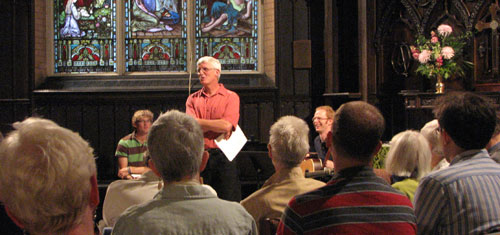 And so it goes from each of the members of the community who preached and prayed, sang and read, honest, raw, free-verse homilies befitting the sort of oracles they are pondering there together and the sober setting in which they find themselves. These are not academic lectures or preacherly pronouncements from a big elevated pulpit, they are punchy, poetic, but right to the heart, in gritty, common language. It is rare to hear this blunt, Bible talk, offering lament and outrage and zeal for justice, honest about pain and confusion. It’s what we need.
And so it goes from each of the members of the community who preached and prayed, sang and read, honest, raw, free-verse homilies befitting the sort of oracles they are pondering there together and the sober setting in which they find themselves. These are not academic lectures or preacherly pronouncements from a big elevated pulpit, they are punchy, poetic, but right to the heart, in gritty, common language. It is rare to hear this blunt, Bible talk, offering lament and outrage and zeal for justice, honest about pain and confusion. It’s what we need.
Week by week, they gathered in the cold (and dark) of winter and go through this somewhat similar habit-forming liturgy. A reflection, a reading of the text. Music, prayers, responses, bread and wine, more music. The prayers and poems and reflective litanies in response to the homily each time are very, very good.
These responsive litanies and powerful prayers in HBB are not designed or offered here just for you to use — it’s not that kind of a book — although I am sure you could be inspire to craft your own informed by their process. And some really could be swiped – they are that good! (You can see some of the creative liturgies they’ve done in other settings, here. They invite you to use them with due acknowledgment, so no “swiping” is necessary.)
A few readers may wonder if this Wine Before Breakfast community is adequately orthodox, with proper emphasis on proper doctrine. Maybe not, I don’t know those details, although, let me assure you, they are committed to being shaped by the Word, in this case, the good news of the gospel of Habbakkuk, who is scary and hard and weird and somehow God’s truth. For what it is worth, here is a wonderful reflection Brian offered after being surprised for a party celebrating his 20th anniversary of doing ministry in that setting. (They sure do like to party, and, in that regard, they are like their Master, who had a reputation for such things, you know…)
The subtitle of Habakkuk Before Breakfast, though, you will recall, is “Liturgy, Lament, and Hope.”
As in other Biblical studies Walsh has done — say, his marvelous book co-written with his wife, Sylvia Keesmaat, Colossians Remixed or the densely succinct set of Advent devotionals co-written with three other colleagues, The Advent of Justice, or the spectacularly interesting Bible monologues in Beyond Homelessness (a high-point of the book for many) — Walsh Is very, very committed to the authority of the Bible as the very Word of God. But the life-giving revelation comes alive in community, and that is why he wasn’t kidding when he said, that third week, riffing on that Bono quip, that “the rest is up to us.” We must grapple with the text, with understanding it, with hearing it, with living with it, and with living its gospel out in our own places.
These litanies and prayers and liturgical forms are not incidental, by the way, they are key to framing the gathering community before God, in the Spirit, as they hear God’s Word in the text. Some of us may wish they’d just be done with the responsive readings and litanies and prayers, no matter how heart-felt and filled with yearning they may be; just get to the good Bible teaching, man! No, this won’t do. These are curated short worship experiences, gatherings around the Word and sacrament, in an edgy sort of blend of contemporary and ancient worship. The Word of the Lord in Habakkuk comes to us in this real world context, and we are privileged to listen in on the preparation and the prayers and the homilies and their hopes of living into the text. The Bible study is amazing, but it’s not the only piece.
(I wish there was a closing section of each — what in the heck did they talk about over muffins? How was the message received? In the next one, I hope they add just a little bit more to bring us into the lived community after the prayers and the songs and the Word.)
Here are the six chapter titles: of Habakkuk Before Breakfast.
 1. Violence and Destruction: How Long?
1. Violence and Destruction: How Long?
2. Of Fish Hooks, Judgement, and Watchtowers
3. The Righteous Live by Faith, But Wealth is Treacherous
4. Idols, Glory, and Silence
5. Drinking Songs and Remembering
6. The Liberating Yet.
You just have to read these for yourselves, but just a quick few shout outs to alert you that this is pretty creative stuff, no matter who was speaking, praying, preaching.
WEEK ONE Here they make use of Tennyson’s awesome poem “In Memoriam” which is perfect for the start of a New Year. One section of this sermon, by the way, explains a bit of what to expect, asking, “Habakkuk in Epiphany?” Walsh had shared earlier how he had this holy hunch that this was the book the community needed for this upcoming season, and about his risky decision to use it as they journeyed through the Toronto winter heading towards Lent. Speaking of the “no holds barred spiritual honesty” of the “rich covenantal tradition” of the prophets, Walsh wrote, earlier,
Is there a particular text we need to hear? A word from God that might be calling us? A biblical author who will lead us more deeply in our ongoing wrestling match with God? Is there a certain place that seems to be an entry into the Story for us at this time? A biblical book that might serve to shape our imaginations, give voice to our longings, resonate with our lament, and engender hope in the midst of it all?
So in the first full chapter (their first chapter back after Christmas holiday) he explains the violence and judgement in the texts they are about to gather around. Whew. The prayers and litanies are perfect.
WEEK TWO: Heads up: Walsh does something with the “fishers of men” line from Jesus. I don’t know if he’s right, and I’ve not heard anybody say this before, but he linked it to the prophet and a typical use of fishhooks in judgement. Check that out, but don’t get distracted. This is quintessential Walsh, explaining how Habakkuk is crying out in protest to God. He draws on a WBB singer-songwriter friend, Martyn Joseph, and a song called “Not a Good Time for God” as well as “Apres Moi” by the powerful Regina Spektor. Wow.
WEEK THREE: I’ve already noted his use of Paul; it is brief but potent. Here he draws us toward the deepest thing of all — faith, God’s faithfulness, our faithfulness. Trust God, he says. Wealth is treacherous, after all, and we know what is coming…. Heavy, good stuff, highlighted beautifully by the description of the music choices.
WEEK FOUR: This is wonderful, again, offering solid exegesis and moving, creative reading of the Biblical passage, bringing together sharp observations about idols, economic growth, empire, and the need for a subversive imagination to stand firm against such corrupt ways. That transforming vision is still on the horizon, though, and he preaches:
Glory replaces shame.
Intimate knowing replaces objectified control.
Silence overtakes the cacophony of empire.
WEEK FIVE: I don’t want to spoil it, but they use a song by Bill Mallonee and VOL, and it involves drinking. As does the Biblical text. Walsh is honest, here, blunt, even. Who couldn’t use a stiff one after all this stuff from the throne of God taking on the horrors of the world and our own need to lament and repent? His take on drinking songs and what sort of memory comes from them is brilliant, although I’ll admit I don’t really know about that. But it sure sounded right. I doubt if you’d hear this kind of stuff in your local Presbyterian or Methodist church these days…
WEEK SIX: A young woman in the community preaches this week and brings it, naming her own inner sin even as she protests the violence and injustice of the world. I had to fight back tears, and you might too. And what does Habakkuk tell them to do? This you’ve got to see. Again, the prayers and songs and litanies, and a closing pray by Philip Newell is very helpful.
This book is a gift to us all, and it is a fundraiser for the work Brian does there at the U of T. I hope you consider getting it.
Just to remind you how urgent and important this is — this community is, as I said, the real deal — you may want to know that the launch party in Toronto to celebrate this book happened a day or so after the Pulse Nightclub murders. Brian said he didn’t intend to preach that night, but it seemed that, even before the book party that evening, they needed to pray and weep and think together. There are hurting students in their community, LGBTQ friends, naturally. So in some ways, pastor Brian summarized the book and the things they experienced together in their series on Habakkuk. Here is a link to that sermon, preached just a few weeks ago and published in their Empire Remixed website.
Here is what N.T. Wright says about the new book:
Habakkuk Before Breakfast is like no other book on the prophet. That’s because it is, itself, prophecy — and poetry, and preaching, and prayer, and liturgy, and lament, and a dozen other things melded together into a powerful, and powerfully disturbing book. A book to shake us up and make us realize that God’s loving justice is the only firm ground on which anyone — or any society — can stand.
I like the blurb on the back by Karen Pascal, the Executive Director of the Henri Nouwen Society & Legacy Trust. (Nouwen lived in Toronto, you may recall.) She writes:
Habakkuk Before Breakfast will both disarm you and make you thirsty with its honesty. It will meet you, refine you, and call you onward. A deep sense of community is woven into the pages of this genuine collaboration of the prophets and poets of the Wine Before Breakfast community. As a reader, you are engaged not just by the ideas but by the community. As they stand on the wall and wait, this book offers us a relentless wrestling with God who is ultimately and forever faithful.
And, listen to this, from Mark Wallace of the Christian Reformed Church:
Once again, the Wine Before Breakfast community invites us to join them at their table of gathered worship. These liturgies, written in the language of longing and lament, in the voices of this community, call us to engage with the works of Habakkuk, and with the prophets and poets of our time. These words, forged in shared experience, in joy and pain, call us to join in the radical resistance of sitting and eating in the midst of a bewildering age. Be warned, this is not comfort food, yet you will be longing for more.
TEN MORE YOU SHOULD KNOW ABOUT
 St. John Before Breakfast Brian J. Walsh and the Wine Before Breakfast community (Books Before Breakfast) $18.00 I mentioned this several times above — I did a larger review when it first came out. What a great idea, sharing these Biblical studies and homilies and liturgies with us all. By the way, this was to be a fund-raiser for them, so if you buy ’em from us, we’ll have to order more from them (no publisher or distributor.) Get it? If you want to support this kind of indie book publishing and serious Biblical study in a real community of young adults, this is a book you should purchase. Plus, it’s darn good stuff, studying John in a way that will blow you away.
St. John Before Breakfast Brian J. Walsh and the Wine Before Breakfast community (Books Before Breakfast) $18.00 I mentioned this several times above — I did a larger review when it first came out. What a great idea, sharing these Biblical studies and homilies and liturgies with us all. By the way, this was to be a fund-raiser for them, so if you buy ’em from us, we’ll have to order more from them (no publisher or distributor.) Get it? If you want to support this kind of indie book publishing and serious Biblical study in a real community of young adults, this is a book you should purchase. Plus, it’s darn good stuff, studying John in a way that will blow you away.
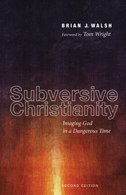 Subversive Christianity: Imaging God in a Dangerous Time
Subversive Christianity: Imaging God in a Dangerous Time
(2nd edition) Brian J. Walsh (Wipf & Stock) $17.00 I’ve mentioned this often, and really hope you’d consider it. I’ve read these essays/sermons/talks/chapters over and over during the last decade and they are sustaining, powerful, significant. After The Transforming Vision but before Truth Is Stranger, as I recall, Walsh gave some of these talks furthering this worldviewish critique of modernity, capitalism, the idols and ideologies of economic growth, scientism, technocism, all bearing fruit in technologies of war and environmental abuse. How can we learn to name these things? What does it mean to image God in modern day Babylon? How does our dis-ease and confusion about our culture effect our faith? What would it take to have faith truly be subversive of the idols of the dominant culture? This is a power-house of a book, with a new chapter added a couple of years ago when it was re-issued. A must-read!
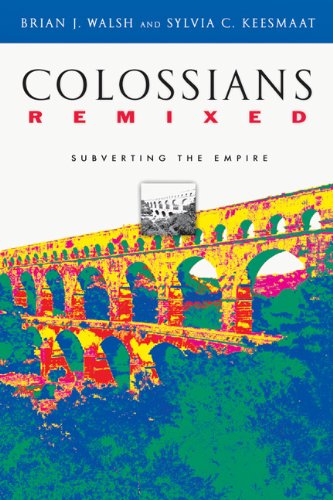 Colossians Remixed: Subverting the Empire Brian J. Walsh & Sylvia C. Keesmaat (IVP Academic) $24.00 I’ve mentioned this above, indicating it shows mature Scriptural scholarship applied in exceptionally serious ways. I thought I should list it here. This really is an audacious, brilliant bit of work, with more than one viewpoint offered as a conversation occurs on the meaning of the text and as they bring the early church experiences to us in creative storytelling and powerful cultural analysis. This is solid Biblical exegesis, a specific book studied not only in it’s own context, but within it’s own place in the unfolding redemptive plan revealed in Scripture. They see echos of the Old in this letter of Paul’s and they see within the struggles of these early Christ-followers hints of how we can live out our faith today. Endorsements include rave reviews from Tom Wright, Marva Dawn, Andrew Lincoln, Walt Brueggemann, Frank Thielman and other top notch Biblical scholars. And some bookseller guy from Dallastown who’s stuck in there raving among the big names. I still love this book and highly recommend it — hold on to your hat, though. Colossians Remixed will challenge how you read the Bible, how you think about discipleship and church, and how you see the world.
Colossians Remixed: Subverting the Empire Brian J. Walsh & Sylvia C. Keesmaat (IVP Academic) $24.00 I’ve mentioned this above, indicating it shows mature Scriptural scholarship applied in exceptionally serious ways. I thought I should list it here. This really is an audacious, brilliant bit of work, with more than one viewpoint offered as a conversation occurs on the meaning of the text and as they bring the early church experiences to us in creative storytelling and powerful cultural analysis. This is solid Biblical exegesis, a specific book studied not only in it’s own context, but within it’s own place in the unfolding redemptive plan revealed in Scripture. They see echos of the Old in this letter of Paul’s and they see within the struggles of these early Christ-followers hints of how we can live out our faith today. Endorsements include rave reviews from Tom Wright, Marva Dawn, Andrew Lincoln, Walt Brueggemann, Frank Thielman and other top notch Biblical scholars. And some bookseller guy from Dallastown who’s stuck in there raving among the big names. I still love this book and highly recommend it — hold on to your hat, though. Colossians Remixed will challenge how you read the Bible, how you think about discipleship and church, and how you see the world.
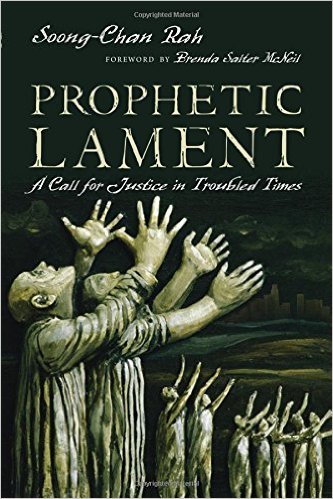 Prophetic Lament: A Call for Justice in Troubled Times Soong-Chan Rah (IVP) $17.00 I have mentioned this often; it is a lively and moving commentary on the Old Testament book of Lamentations. If you resonate with Habakkuk’s call to big picture stuff, global concerns, justice and our corporate brokenness, this could be really useful. If you like the way Walsh weave lament into his sermons about justice and hope, then you will realize the value in this sort of prophetic imagination, shaped by the Word and by modern day injustices. We need books like this, for sure.
Prophetic Lament: A Call for Justice in Troubled Times Soong-Chan Rah (IVP) $17.00 I have mentioned this often; it is a lively and moving commentary on the Old Testament book of Lamentations. If you resonate with Habakkuk’s call to big picture stuff, global concerns, justice and our corporate brokenness, this could be really useful. If you like the way Walsh weave lament into his sermons about justice and hope, then you will realize the value in this sort of prophetic imagination, shaped by the Word and by modern day injustices. We need books like this, for sure.
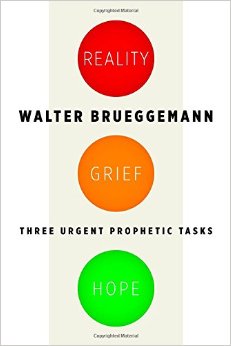 Reality, Grief, Hope Walter Brueggemann (WJK) $15.00 This is, in many ways, the book decades in the making, a simple and passionate follow up to The Prophetic Imagination. Like Walsh, Brueggemann highlights lament, drawing on the prophets own denunciation of ancient Israel, calling a remnant community to stand in covenantal fidelity, seeing thinks as God does, even if it puts us at odds with church and state. Brueggemann does really help us see that what happened in 587 BCE is somehow generative for us now, after 9-11 and with the collapse of so many ways of doing things. This is a great little book.
Reality, Grief, Hope Walter Brueggemann (WJK) $15.00 This is, in many ways, the book decades in the making, a simple and passionate follow up to The Prophetic Imagination. Like Walsh, Brueggemann highlights lament, drawing on the prophets own denunciation of ancient Israel, calling a remnant community to stand in covenantal fidelity, seeing thinks as God does, even if it puts us at odds with church and state. Brueggemann does really help us see that what happened in 587 BCE is somehow generative for us now, after 9-11 and with the collapse of so many ways of doing things. This is a great little book.
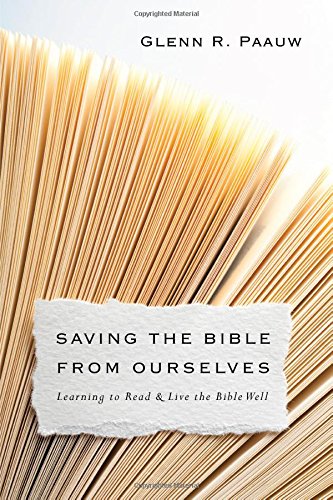 Saving the Bible From Ourselves: Learning to Read and Live the Bible Well Glenn R. Paauw (IVP) $18.00 I am quite taken with this and can’t wait to really dive in. Each chapter explains a posture or tendency that we have to make the Bible harder than it needs to be, or more confusing, or readings that are prone to cause us to miss the meaning of the text. For each error, Paauw gives an alternative approach, fresh ways to save the Bible — not because the Bible needs saving, but because we’ve learned bad habits of reading it wrongly. I get it. This is good, good stuff. Endorsements on the back from Walter Brueggemann He calls it “puckish” but series. Another endorsement rings out from Mark Noll.
Saving the Bible From Ourselves: Learning to Read and Live the Bible Well Glenn R. Paauw (IVP) $18.00 I am quite taken with this and can’t wait to really dive in. Each chapter explains a posture or tendency that we have to make the Bible harder than it needs to be, or more confusing, or readings that are prone to cause us to miss the meaning of the text. For each error, Paauw gives an alternative approach, fresh ways to save the Bible — not because the Bible needs saving, but because we’ve learned bad habits of reading it wrongly. I get it. This is good, good stuff. Endorsements on the back from Walter Brueggemann He calls it “puckish” but series. Another endorsement rings out from Mark Noll.
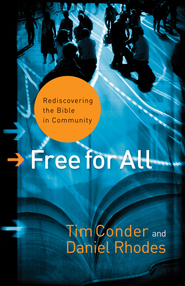 Free for All: Rediscovering the Bible in Community Tim Condor & Daniel Rhodes (Baker) $16.99 This was a splendid, generative book that came out of the “emergent village” imprint a number of years ago. It’s out of print but we have a few left. I know Walsh liked it — it’s main point being that we must unleash the Scriptures among us, allow us all to share our thoughts, and struggle hard for a fair and communal reflection on the meaning of it all. I think this is a strong resource, for those who understand that we need a communal reading and interpretation of Scripture and for those who have been hurt by more didactic and authoritarian teaching. It seemed right to name it here. It had been rigorously endorsed with nice blurbs from Walsh, Will Willimon, Stanley Hauerwas, Phylllis TIckle, and John Franke.
Free for All: Rediscovering the Bible in Community Tim Condor & Daniel Rhodes (Baker) $16.99 This was a splendid, generative book that came out of the “emergent village” imprint a number of years ago. It’s out of print but we have a few left. I know Walsh liked it — it’s main point being that we must unleash the Scriptures among us, allow us all to share our thoughts, and struggle hard for a fair and communal reflection on the meaning of it all. I think this is a strong resource, for those who understand that we need a communal reading and interpretation of Scripture and for those who have been hurt by more didactic and authoritarian teaching. It seemed right to name it here. It had been rigorously endorsed with nice blurbs from Walsh, Will Willimon, Stanley Hauerwas, Phylllis TIckle, and John Franke.
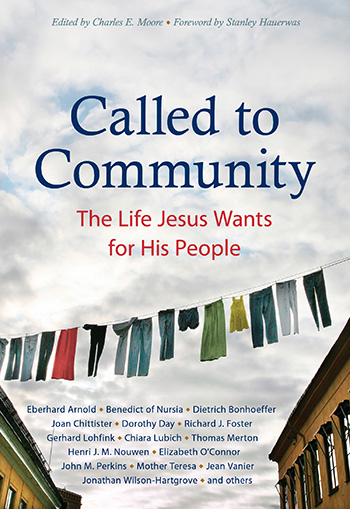 Called to Community: The Life Jesus Wants for H
Called to Community: The Life Jesus Wants for H
is People edited by Charles Moore (Plough Publishing) $18.00 This is a stunning new anthology of beauitful excerpts of books, essays, articles, Bible studies and sermons on the themes of community. This is a 52-week study, a great resource for anyone needing more insight about living together amidst our own foibles and the culture’s pressures. Hear from Bonhoeffer and Dorothy Day, Jean Vanier and John Perkins, Joan Chittister and Richard Foster, Henri Nouwen, Betty O’Connor, Jonathan Wilson-Hartgrove, Andy Crouch, Gerhard Lohfink, C.S. Lewis, Thomas Merton, and others. So glad to see Plough publishing again. This is a treasure-chest!
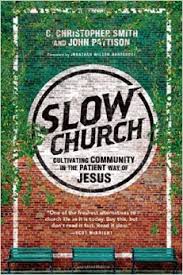
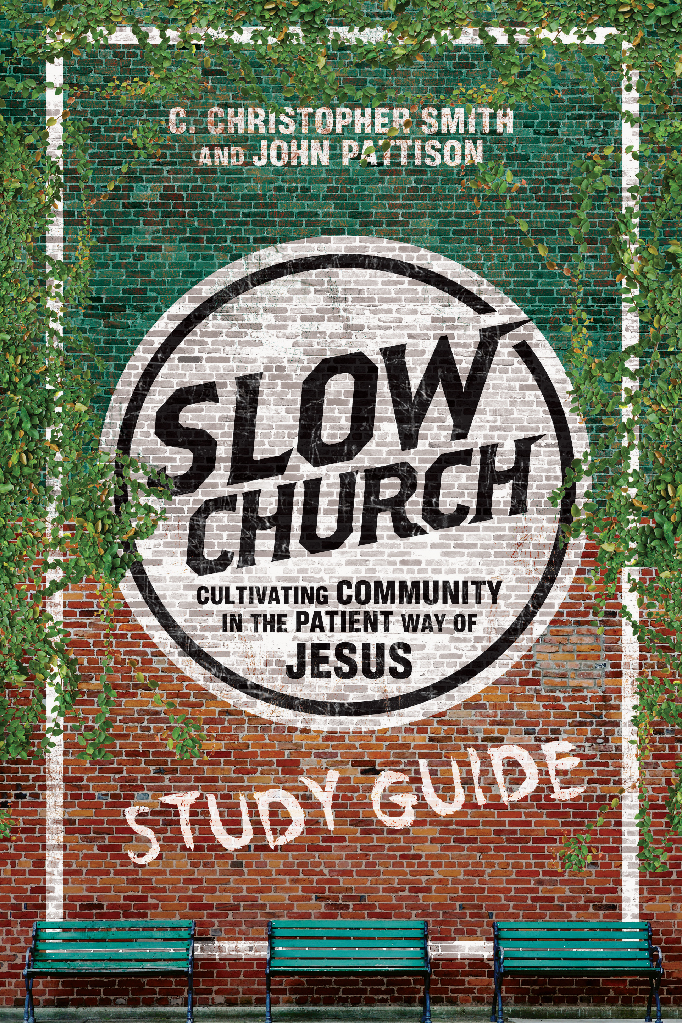 Slow Church: Cultivating Community in the Patient Way of Jesus C Christopher Smith & John Pattison (VIP) $17.00 I have said over and over that this is one of the most significant books on the church I’ve read in decades. It brings a Walsh-like critique to the idols and ideologies of growth and status and efficiency and invites us to slow down, build community, learn patience and through God’s grace, gather a human-scale sort of missional energy for our own neighborhoods. Learning a sense of place, having an eye for injustice, but enjoying the good things in our areas is all part of what it means to be followers of Jesus in a slower church. There’s a good study guide for it, now, too.
Slow Church: Cultivating Community in the Patient Way of Jesus C Christopher Smith & John Pattison (VIP) $17.00 I have said over and over that this is one of the most significant books on the church I’ve read in decades. It brings a Walsh-like critique to the idols and ideologies of growth and status and efficiency and invites us to slow down, build community, learn patience and through God’s grace, gather a human-scale sort of missional energy for our own neighborhoods. Learning a sense of place, having an eye for injustice, but enjoying the good things in our areas is all part of what it means to be followers of Jesus in a slower church. There’s a good study guide for it, now, too.
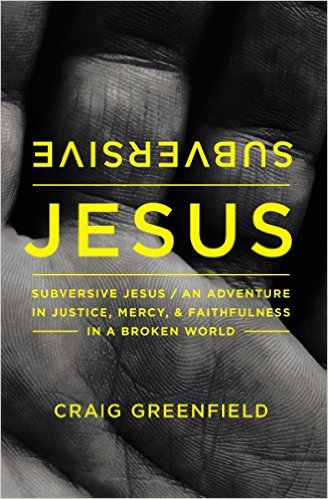 Subversive Jesus: An Adventure in Justice, Mercy & Faithfulness in a Broken World Craig Greenfield (Zondervan) $15.99 I wasn’t sure this was going to be all that profound — the word “subversive” is over-used and not every hip book about doing cool justice work is that good — until an old CCO friend told me they knew this guy and assured me he was doing great work, and that we’d love his forthcoming book. And, wow, what a book — I could hardly put it down. It is conversational but mature, and he is obviously involved in doing inspiring work. And Greenfield has some fun, too. His antics protesting cruise ship injustices by getting a group to dress like pirates was hilarious — sort of a cross between Shane Claiborne and Bob Goff. (And they didn’t just act up once, but entered into longer-term relationships with third world workers on these ships who are terribly abused. Who knew?)
Subversive Jesus: An Adventure in Justice, Mercy & Faithfulness in a Broken World Craig Greenfield (Zondervan) $15.99 I wasn’t sure this was going to be all that profound — the word “subversive” is over-used and not every hip book about doing cool justice work is that good — until an old CCO friend told me they knew this guy and assured me he was doing great work, and that we’d love his forthcoming book. And, wow, what a book — I could hardly put it down. It is conversational but mature, and he is obviously involved in doing inspiring work. And Greenfield has some fun, too. His antics protesting cruise ship injustices by getting a group to dress like pirates was hilarious — sort of a cross between Shane Claiborne and Bob Goff. (And they didn’t just act up once, but entered into longer-term relationships with third world workers on these ships who are terribly abused. Who knew?)
His years of experience in Cambodian, his journey to serve the poorest of the poor, and how that mission involvement effected his own faith development was beautiful. When Jesus’s teaching of love for enemies struck him, he and his wife baked cookies for local drug dealers (and none of them showed up — our gestures of faithfulness don’t always “work.”) This is an upbeat, adventurous book, although the story of him getting cancer was grueling. If you like Walsh and this kind of lived out, joyful sort of mission in the, this will be a good read. Great work, Zondervan, for offering this inspiring, healthy story about learning to weep at injustice, and do something about it. I hope they keep doing books like this, and I hope we keep hearing from Craig Greenfield.

BookNotes
DISCOUNT
ANY ITEM MENTIONED
10% off
order here
takes you to the secure Hearts & Minds order form page
just tell us what you want
inquire here
if you have questions or need more information
just ask us what you want to know
Hearts & Minds 234 East Main Street Dallastown, PA 17313 717-246-3333
